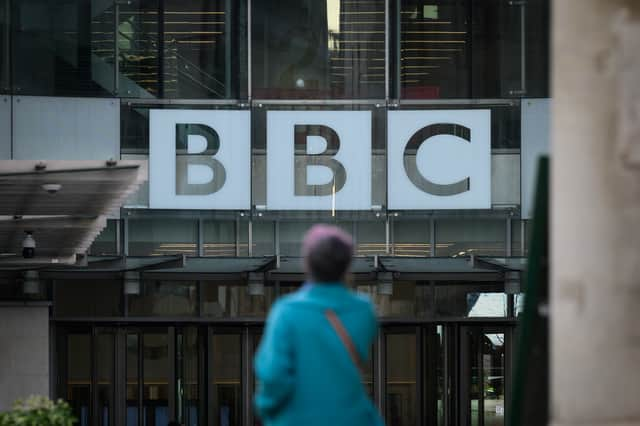BBC's 'independent' badge is slipping while charging licence payers twice for the same content - it must stop


An impartial, independent news and entertainment company, tasked with providing “the most creative, highest quality and distinctive output”. I think most of us would be happy to pay £15 a month for that.
That is, in fact, exactly what the BBC says it should be. So our licence fee should be great value for money. But it isn’t, and here’s why.
Advertisement
Hide AdAdvertisement
Hide AdBBC News has, for generations, been up there with the best, there’s no doubt about it. It has ‘done impartiality’ better than anyone else in the world. Sport, too, has always been at the forefront of televisual coverage; from Match of the Day to Test Match Special, the darts from Lakeside, or the snooker from the Crucible. All much loved content.
However, that media giant, once loved by the nation, feels like a distant memory. While right-wing mouthpieces such as Lee Anderson and Nadine Dorries scream about ‘remainer bias’, the fact is, Sir Robbie Gibb (knighted by Boris Johnson, of course), is a non-executive member of the BBC Board. Sir Robbie’s previous roles include chief of staff to Conservative MP Francis Maude and Theresa May’s director of communications in Downing Street. Oh, and his brother is Tory MP Nick Gibb. Rather a lack of ‘left-wing remainer’ credentials there.
And the man atop it all - Tim Davie - a failed Conservative candidate in local elections in 1993 and 1994, as well as being deputy chair of the Hammersmith and Fulham Conservative Association. Not sounding quite so independent now, is it?
Meanwhile, continuing our trawl through the channels of disappointment, we come to BBC Entertainment. I’m struggling to remember anything after The Office (which ended in 2003) that was truly groundbreaking or, frankly, innovative.
Advertisement
Hide AdAdvertisement
Hide AdOkay, it’s reinvented Strictly, enjoyed by many. Not me, but many, so I’ll give them that. I will also admit to loving a good binge of paranormal sitcom, Ghosts, on a semi-regular basis - my guilty pleasure and one perhaps I should thank the Beeb for. But at a cost of potentially £15-a-month? No, they really should be thanking me and all the other licence payers.
Which brings us nicely on this story arc to value for money. I pay £11.99 a month for Netflix. £6.99 a month for Amazon Prime (which includes the telly bit). All available, when I want it. When I search for specific shows on iPlayer, however, that is frequently not the case. Why is so much missing?
I suspect much of it is now behind the paywall known as BritBox - the online streaming service set up by BBC Studios and ITV to compete with the likes of Netflix. Yes, that would be BBC Studios Ltd, a commercial arm of the Beeb - funded by us, of course - to develop, produce and sell BBC content around the world.
It returns around £200 million to the BBC each year in cash and ‘content development’, but why is it there at all? BritBox and BBC Studios Ltd might have a role to play flogging our classics to the rest of the world. Fine. Let’s export it and bring some money back in. But we UK couch potatoes have already paid for it, and I for one refuse to cough up again for the subscription service. It’s an insult.
Advertisement
Hide AdAdvertisement
Hide AdThe once beloved Aunty now seems to have developed some kind of addiction, constantly looking for more cash and refusing to listen to reason spoken by those who once held it dear. But really, how much longer should we be forced to fund this habit before we say, enough is enough, and get her into rehab?
Comment Guidelines
National World encourages reader discussion on our stories. User feedback, insights and back-and-forth exchanges add a rich layer of context to reporting. Please review our Community Guidelines before commenting.
